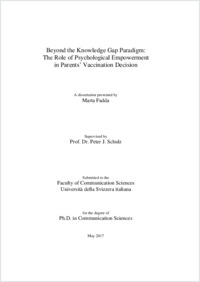Beyond the knowledge gap paradigm : the role of psychological empowerment in parents’ vaccination decision
- Fadda, Marta
- Schulz, Peter J. (Degree supervisor)
-
14.07.2017
228 p.
Thèse de doctorat: Università della Svizzera italiana, 2017 (jury note: Summa cum laude)
English
Even though the efficacy and safety of immunization have been widely proven (Plotkin, 2014), an increasing number of parents have refused to vaccinate their children against serious infectious diseases in the past twenty years (Dubé, Gagnon, Nickels, Jeram, & Schuster, 2014). A recent shift in the study of vaccination decision- making has seen scholars moving beyond the idea that mere lack of knowledge could explain why parents decide to opt out of the recommended schedule, showing that making a vaccination decision is a complex cognitive and emotional process where several factors play a role. Variables such as risk perception, anticipated regret or prosocial attitude can potentially contribute to choosing or not choosing a given vaccination (Yaqub, Castle-Clarke, Sevdalis, & Chataway, 2014). The aim of this dissertation, which is based on the Health Empowerment Model (Schulz & Nakamoto, 2013), is to explore and assess the role of vaccination knowledge (as a dimension of vaccination literacy) in parental vaccination decision-making, while studying, at the same time, the implications of parents’ psychological empowerment on the decision about immunizing their child, with a special focus on the measles-mumps-rubella (MMR) vaccination. Six unique studies that employed both qualitative (individual interviews and focus groups) and quantitative (content analysis, survey and experiment) methods are presented, which aim to assess the influence of vaccination literacy and psychological empowerment on vaccination-related outcomes such as intention, while providing a valid and reliable measurement tool for the empowerment construct as well as a context-specific conceptualization. A content analysis (Chapter II) focusing on the arguments cited by users posting online about vaccination shows that a distinction can be made between an anti-vaccination group, a general pro- vaccination group (using diverse arguments supporting vaccination) and a safety- focused pro-vaccination group. The anti-vaccination group appears to be more active than the others and to also use multiple sources (mainly its own experience and media). The findings of an interview study (Chapter III) reveal that parents tend to misinterpret current vaccination recommendations and experience negative outcomes of their low self-perceived competence. The study also shows that parents think that their MMR vaccination decision can have an impact on different levels and that they have a preference for shared-decision making in relation to their child’s healthcare provider. A second qualitative study employing focus group interviews (Chapter IV) shows that parents are concerned with their legal responsibility and issues of freedom with regards to the MMR vaccination decision. A key finding is that parents’ relationship with the pediatrician in terms of trust is crucial to their self-perceived competence, suggesting their preference for a model of autonomy that does not exclude a shared decision-making approach with the child’s healthcare provider. Finally, a distinction emerges between information seekers, avoiders, and passive recipients. A scale is developed and its psychometric properties are evaluated (Chapter V) to provide a valid and reliable tool to measure psychological empowerment in the vaccination decision. The final tool captures parents’ perceived influence of one’s personal and family experience regarding vaccination, their desire not to ask other parents about their experience with vaccinations and their lack of interest in the vaccination opinion of other parents. These elements can be seen as context-specific extensions of the empowerment dimension of self-determination. The findings of an experimental study (Chapter VI) demonstrate that providing accurate information on the vaccination through a smartphone app employing gamification can positively and significantly increase parents’ knowledge and empowerment. Furthermore, providing information in a gamified way also led to a higher intention to vaccinate and higher parental confidence in the decision. Finally, a mixed method study to evaluate the experiment described above (Chapter VII), suggests that parents have a preference for information and opinions, compared to solely being empowered and pushed to look for information. The results recommend that empowering efforts be always accompanied by proper and exhaustive information. On the basis of these findings, this dissertation contributes to understanding parents’ empowerment needs in the vaccination decision, providing new insights to current research that seeks to study the vaccination decision as a complex process. The results of the studies can significantly inform ways to improve not only communication between health professionals and parents on the vaccination topic, but also future public health strategies and policies ultimately aimed at increasing vaccination coverage.
- Language
-
- English
- Classification
- Medicine
- License
-
License undefined
- Identifiers
-
- RERO DOC 289175
- URN urn:nbn:ch:rero-006-116421
- ARK ark:/12658/srd1318851
- Persistent URL
- https://n2t.net/ark:/12658/srd1318851
Statistics
Document views: 484
File downloads:
- Texte intégral: 299
